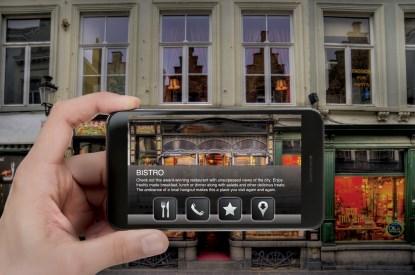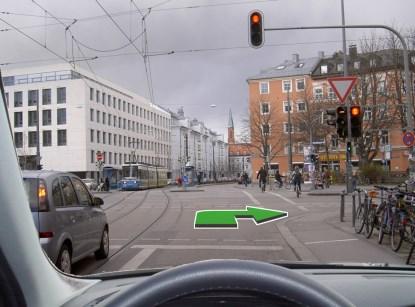


In my previous blog on this topic, we looked into some of the delivery mechanisms that might be used to present us with augmented reality information. The next question, of course, is what sort of augmented reality information do we expect and/or want to be delivered?
The impression I have after talking to a number of people is that they expect augmented reality data to be reasonably benign. They also expect it to be a "pull" type model in which they will have the ability to decide just how much information comes their way. The sort of thing a lot of people think of when you say "augmented reality" is looking at the world through their smartphone in a supermarket and being alerted to an interesting sale, for example.

Another popular theme is to be able to look through one's handheld device at something like a restaurant, and to then be provided with information like today's menu, dining hours, customer reviews, and so forth.

For myself, I'm looking a bit farther out. Take navigation, for example. Today's GPS systems that you get in cars are, in many ways, incredible, but it's still a pain having to look down at a small screen, and the spoken directions are often not as clear as one might like ("Stay right and then turn left"). Even "Turn right in 250 yards" may not be optimum if you can see multiple right turns in close proximity to each other.
There's also the fact that a lot of graphical presentations try too hard and can overwhelm the user with too much information. On the other hand, a simple, well-conceived graphic truly can be worth 1,000 words.

Now, there are some very interesting heads-up-display technologies around, but I'm thinking beyond them. I'm not sure what delivery mechanisms will ultimately become available to us (from Google Glass to fully immersive Oculus Rift-type headsets to active contact lenses and beyond). Whatever the delivery mechanism turns out to be, I am envisaging something that we don’t have to hold in our hands, that can overlay graphical data anywhere in our visual field (we'll leave things like audio, tactile, and olfactory versions of augmented reality as topics for another day), and that is always-on (we'll return to this last point in a while).
The really interesting thing to me is the sort of augmented reality information that might be made available to us. The following are a few ideas off the top of my head -- I would be very interested to hear your thoughts on these, along with other ideas you have of your own.
Let's start with a simple one. Suppose you are in a foreign country and you look at an indecipherable sign. Suppose your augmented reality system is aware of the languages you know and don’t know, and automatically performs the translation and superimposes it over the original. Wouldn’t that be cool?
In the case of navigation, we typically think of an automotive experience as depicted above, but I've spent a lot of time on foot wandering around strange cities. Let's assume that I've given my augmented reality system the name "Maximillian" and that responds to (only my) spoken commands. I can envisage exiting a hotel in San Francisco, saying something like "Maximillian, show me the way to Fisherman's Wharf," and having a faint dotted line or arrows or whatever be unobtrusively overlaid on the scene in front of me.
When I was a student living in Sheffield, England, all of my friends would be calling each other early in the evening to decide where we would be going that night. This was before the days of cellphones, so once a plan had been made, everyone tended to stick to it (unlike my son and his friends, whose plans seem to undergo a continuous morphing process). Once one was out and about, there was no way to know where everyone else was.
Now consider an augmented reality scenario. Suppose I could see recent virtual tracks (lines or arrows hovering just above the ground) left by my friends. These tracks could be color-coded for each friend, and -- by default -- could fade away over time. Alternatively, as I passed a bar, for example, some form of a visual indication could inform me if anyone I knew was in there. Or perhaps I could call up a bird's eye view of the immediate area to see where all of my friends were currently located. (Note that many of these capabilities are already available as smartphone apps -- I'm simply extrapolating them to an augmented reality delivery system.)
Apropos of nothing at all, have you seen the latest quadcopter drone from Parrot? It's called the Bebop (who can comment first as to why this name has a special significance to me?). Check out this BBC video. It's well worth watching the whole thing, but an especially interesting part starts around the 1'34" mark when the operator uses an Oculus Rift to see the world through the eyes of the drone. Judging by his exclamations this is pretty impressive. I would really like to see what he is seeing. But we digress…
Suppose you were in the market for a new house. It's a Saturday morning and you are walking or driving around a new subdivision. Can you imagine an augmented reality scenario whereby details of the houses that are available for sale appear superimposed over them, including things like price, size, number of rooms, and special features? How about being able to quickly access additional information like the builder's reputation with the better business bureau and the quality of the local schools?
This all sounds quite benign and useful, doesn’t it? But now suppose that by simply looking at the neighboring houses that had already been sold, you could access details about their occupants. How much did they pay for their houses, for example? How many people live there? How many children are there (and what ages)? Does the home owner's association have liens on any of the properties? Where do the occupants work? Have any of them been convicted of any crimes?
I have a terrible head for names and faces. Things get really bad if it's someone I used to work with at a company 20 years ago, or perhaps someone I met at a conference a few years ago. At official functions, people like the Queen of England have assistants who whisper the names of the people she's about to meet into her ear. I would love for my Maximillian augmented reality system to be able to do the same thing.
As I'm walking through the mall, for example, its facial recognition software could identify people with whom I am in some way acquainted and indicate them to me (perhaps using flashing arrows over their heads -- maybe using different colors to indicate different levels of acquaintanceship). As we approached Maximillian could superimpose additional information on the scene (or whisper nuggets of knowledge in my ear) as to the person's name along with the names of their partner and children and so forth. It would be especially useful if Maximillian reminded me that we used to work at Company XYZ 20 years ago. Maybe Maximillian could access LinkedIn to see where my acquaintance works now. Perhaps Maximillian could also check Facebook and Twitter and alert me to any additional information that may be of interest, such as the fact that it's my acquaintance's birthday, or the fact he just got divorced and 30 seconds ago he Tweeted that he's going to beat up on the next person he sees.
All of this is a double-edged sword, of course. If you can access information about other people, then presumably they have the same ability. How much information would you be comfortable sharing with the world? Do you want everyone to know how much you ate for lunch, or how many martinis you quaffed for breakfast? If you have young children, it would be advantageous to you if any registered sex offenders appeared with a big red warning mark flashing over their heads. Imagine being able to tell your kids to run away if they ever see this sign. Of course, I'm sure the registered sex offenders would be somewhat less enthusiastic about all of this.
Another thing to consider is a "push" model in which information is pushed at you via your augmented reality system. Suppose you are walking past a store, for example, and they can detect who you are and determine your name, age, sex, and so forth. Maybe they can also access your personal interests and preferences based on your past purchasing experiences. It wouldn’t take much effort to discover that I'm partial to Hawaiian shirts or that I have been known to quaff the occasional beer, for example. Now suppose that the store can start projecting visual and audible adverts into your augmented reality system. On the bright side, I already hear voices whispering "You really deserve to own that flashing LED thingy, whatever it is" when I pass an electronics store, at least now I would know that the voices were real.
It seems to me that if it becomes possible for all of this information to be made accessible to the world, then we are also going to have to be able to filter what we see and what we allow to be seen. If we want our friends to be able to locate us, then we allow our systems to report on our location, but we also need to have the ability to drop below the radar, as it were.
I have so many thoughts bubbling around in my head at the moment that I don't know where to go next. Maybe this would be a good time to throw the floor open for everyone else to share their thoughts on this topic. What do you think? How much of what I've talked about here do you consider to be plausible? How much do you consider to be inevitable? And what sort of timeline do you think we are looking at here? As always, I welcome your comments and questions.
 /3
/3 
文章评论(0条评论)
登录后参与讨论